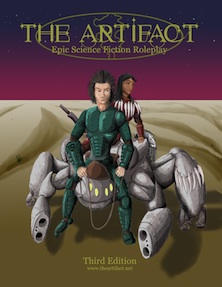I’ve been studying up on character development because in the campaign we’re currently in there is a rich opportunity for interesting NPCs since the PCs don’t know who’s on their side and who’s their enemy. One of the things I want to play with is the classic dramatic motivations just to see what happens with how the players respond to the NPCs. If you’re not familiar with them they are,
- Someone to pursue a goal (the Protagonist)
- Someone to avoid the goal (the Antagonist)
- Someone that helps
- Someone that hinders
- Someone encouraging to consider a plan
- Someone encouraging to reconsider a plan
- Someone encouraging logic or reason
- Someone encouraging feeling or emotional fulfillment
- Someone encouraging excersizing control
- Someone encouraging being uncontrolled
- Someone to appeal to conscience
- Someone to appeal to temptation
- Someone who supports (speaks for) efforts
- Someone who opposes (speaks against) efforts
- Someone to express faith
- Someone to disbelieve
Each motivation has it’s opposing motivation. In a story, usually only one character fufills these roles at a time but I’m not going to worry about that at the moment.
The first motivation is for the protagonist, so no NPC would get that one since it normally would go to the PCs. Actually you could give it to an NPC and have the PC take up another one of these motivations but it would take buy in from the players, either tacitly or explicitly for that to work.
So what I’m doing is rolling a die to see which one of these each NPC will start off being. Low roll and the first motivation is chosen for that character, high roll means the second motivation is chosen. For example, try to imagine an NPC who is . . .
- Someone that helps
- Someone encouraging to reconsider a plan
- Someone encouraging logic or reason
- Someone encouraging being uncontrolled
- Someone to appeal to temptation
- Someone who supports (speaks for) efforts
- Someone to express faith
So this is a character trying to help the players but disagrees on their methods. They’re reasoning and logical about how they do things but maybe that way of life has let them down, so they encourage the PCs to be unpredictable and try to let in to a temptation. What’s interesting about this is, the temptation is traditionally a distraction from the protagonist’s goals. The NPC publicly supports the PCs and expresses faith in them. However since they are trying to get the PCs to reconsider, we know that they have reservations.
Next this rough outline can be applied to the setting and used to really flesh out the NPC’s backstory.
Obviously there could be some combinations that are difficult to reconcile but those are my favorite kind. It could also work to have three conditions when you roll the die. Low means the first choice, a middle value equals the second and high values mean that the character has no part in that motivation.
You could just choose what traits you want the NPCs to take but that seems boring to me. I like to discover the NPC’s by randomly generating them. YMMV.
I haven’t got to use this yet. If the results are particularly significant I’ll post about it. If you use it, leave a comment about how it worked for you.


 The Free RPG Blog
The Free RPG Blog